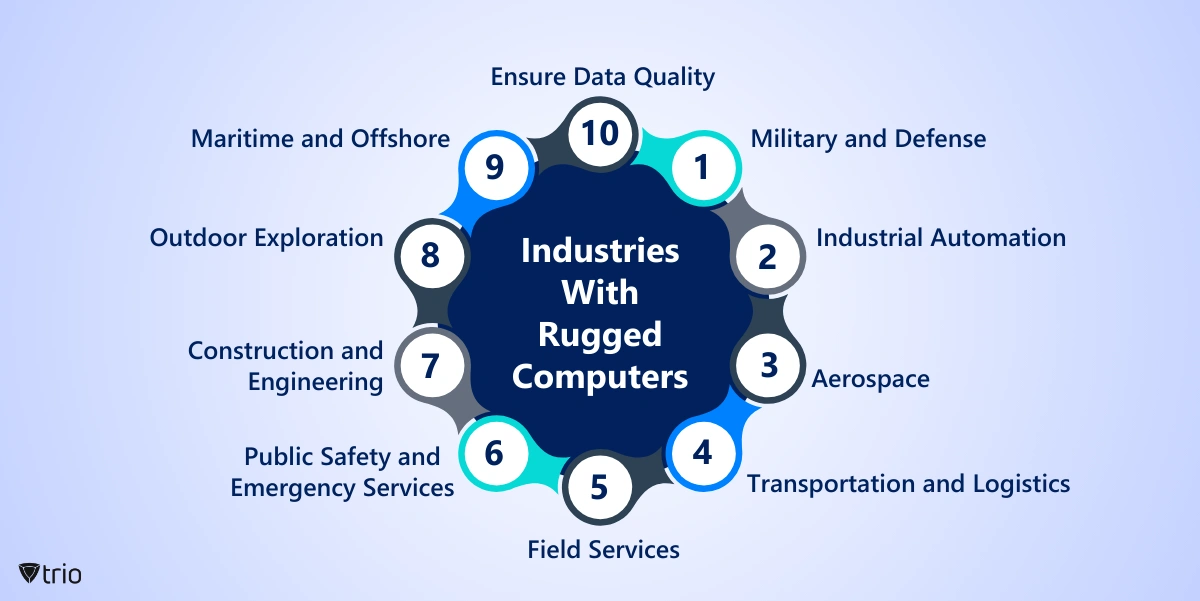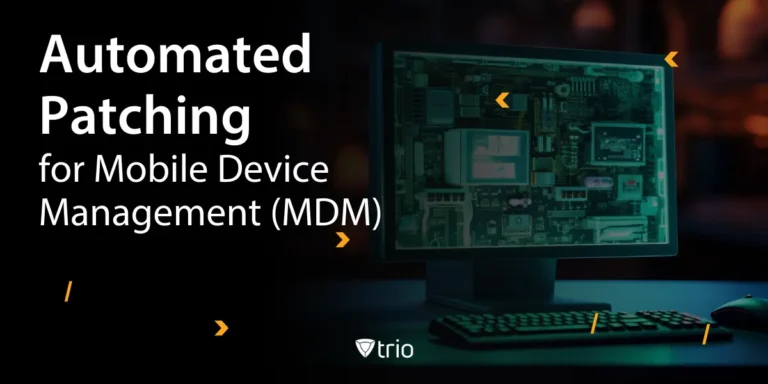In the fast-paced and demanding realms of industries like military operations, manufacturing, and field services, traditional computers often find themselves out of their element. This is where rugged computers step in—a breed of computing devices designed to thrive in harsh conditions, where extreme temperatures, vibrations, and rough handling are the norm. From the factory floor to remote outdoor sites, these robust machines are reshaping the way businesses operate in challenging environments. In this blog post, we'll take a practical look at rugged computers, exploring their diverse types, applications across various industries, and the tangible benefits they bring to the table. Join us as we delve into the pragmatic world of rugged computing and discover why these durable devices are indispensable tools in demanding sectors worldwide.
What is a Rugged Computer?
A rugged computer is a type of computing device that is designed to operate reliably in harsh and demanding environments where standard computers might struggle or fail. These environments can include extreme temperatures, high humidity, dust, vibration, shock, and other challenging conditions. Rugged computers are built to withstand such elements and provide robust performance in settings like military operations, industrial automation, fieldwork, outdoor exploration, and transportation. Key features of rugged computers often include:
- Durability: Rugged computers are built with tough materials that can withstand physical stress, such as drops, impacts, and vibrations.
- Sealing: Many rugged computers are designed to be water-resistant or even waterproof to protect against moisture and dust ingress.
- Temperature Resistance: Rugged computers can operate in a wide range of temperatures, from extremely cold to hot conditions.
- Shock and Vibration Resistance: These computers are often designed to absorb shocks and vibrations to prevent damage to internal components.
- Enhanced Connectivity: Rugged computers may come with additional ports, connectors, and communication capabilities to suit specific applications in the field.
- Sunlight Readability: Displays on rugged computers are often designed to be readable in bright sunlight, a crucial feature for outdoor use.
- Extended Battery Life: For applications in remote areas or when power sources are limited, rugged computers may have extended battery life or support for external power options.
- Security Features: Given that rugged computers are often used in sensitive environments, they may include enhanced security features to protect data and ensure system integrity.
These features make rugged computers suitable for various industries and applications where standard computers may not be able to withstand the challenging conditions. They are commonly used in military, aerospace, agriculture, construction, logistics, and other field-based activities.

Benefits of Using Rugged Computers
Rugged computers can be beneficial in many ways considering in what industry they’re being used. If you’re questioning what rugged computers are used for, here are some industries that they're known to be implemented:
- Military and Defense
- Industrial Automation
- Aerospace
- Transportation and Logistics
- Field Services
- Public Safety and Emergency Services
- Construction and Engineering
- Healthcare
- Outdoor Exploration
- Maritime and Offshore

Types of Rugged Computers
Rugged desktop manufacturers make them in various forms and types, each designed to meet specific environmental and operational requirements. Here are some common types of rugged computers:
-
Rugged Laptops and Notebooks
These rugged laptop computers are compact and portable computers built to withstand challenging environments. They often feature reinforced chassis, shock-resistant storage, and water-resistant keyboards.
-
Rugged Tablets
Rugged tablet computers are designed for field use, offering durability and resilience to environmental factors. They may come with features like drop resistance, sunlight-readable displays, and sealed ports.
-
Rugged Smartphones
Rugged mobile computers such as rugged smartphones are built to withstand rough conditions and are often used in industries such as construction, manufacturing, and field services. They typically have reinforced casings and may be resistant to water and dust.
-
Rugged Handheld Computers
Handheld rugged computers are compact devices designed for ease of use in the field. They are commonly used in industries such as logistics, inventory management, and field data collection.
-
Rugged Panel PCs
Panel PCs are designed for industrial applications and control systems. Rugged versions are built to withstand harsh conditions, featuring sealed enclosures, high shock resistance, and wide temperature ranges.
-
Rugged Servers
Rugged servers are designed for deployment in demanding environments where standard servers might not be suitable. They are often used in military applications, remote field locations, or industrial settings.
-
Rugged Workstations
Rugged workstations are powerful computers built to handle demanding tasks in challenging environments. They are used in industries such as engineering, geology, and military applications.
-
Rugged Embedded Systems
These are compact computing systems integrated into larger machinery or equipment. Rugged embedded systems are commonly used in industrial automation, transportation, and military applications.
-
Rugged In-Vehicle Computers
Designed for use in vehicles such as trucks, cars, or military vehicles, these computers are built to withstand the vibrations and shocks associated with mobile environments.
-
Wearable Rugged Computers
Wearable devices such as smart glasses or wrist-worn computers are designed to withstand tough conditions. They are used in industries like logistics, maintenance, and healthcare.
-
Rugged All-in-One Computers
These computers integrate the display and computing components into a single, compact unit. Rugged all-in-one computers are suitable for applications where space is a consideration.
How MDM Soultions Can Help
Rugged desktop computers and Mobile Device Management (MDM) solutions are connected through their shared relevance in the context of enterprise mobility, especially in industries that rely on field operations and ruggedized devices. Here's how they are interconnected:
-
Device Management
Rugged computers are often deployed in scenarios where mobile devices need to withstand harsh conditions. MDM solutions can help manage and monitor these rugged devices remotely, ensuring they are configured correctly, up-to-date, and compliant with organizational policies and standard mobile content management strategies.
-
Security
Given that rugged computers are commonly used in industries with sensitive data (e.g., military, healthcare), security is paramount. MDM solutions play a crucial role in enforcing security policies, implementing data encryption, and remotely wiping devices in case of loss or theft.
-
Application Management
Rugged computers often run specific applications tailored to industry needs. MDM solutions enable efficient management of these applications through application catalogs, ensuring they are updated, compatible, and secure.
-
Configuration and Customization
Rugged computers may require specific configurations based on the needs of the industry or organization. MDM solutions provide a centralized platform for configuring and customizing device settings, ensuring consistency across the fleet.
-
Monitoring and Diagnostics
Rugged computers operating in challenging environments may experience issues or require diagnostics. MDM solutions enable real-time monitoring, allowing administrators to identify and address issues promptly.
Conclusion
From military operations to field services and beyond, rugged computers are reshaping how businesses operate in demanding environments. The practical benefits, from durability and reliability to enhanced security and adaptability, make them crucial assets. Whether it's a rugged laptop on the factory floor or a durable tablet in the field, these devices offer tailored solutions for diverse industry needs. Moreover, their integration with Mobile Device Management (MDM) solutions showcases their relevance in the broader context of enterprise mobility, providing centralized control and security enforcement. An MDM solution that is both scalable and easy to use is Trio. Get Trio today and see how it can make a huge difference in how you operate your organization.
Get Ahead of the Curve
Every organization today needs a solution to automate time-consuming tasks and strengthen security.
Without the right tools, manual processes drain resources and leave gaps in protection. Trio MDM is designed to solve this problem, automating key tasks, boosting security, and ensuring compliance with ease.
Don't let inefficiencies hold you back. Learn how Trio MDM can revolutionize your IT operations or request a free trial today!





